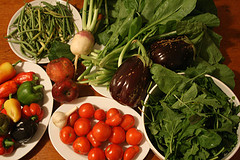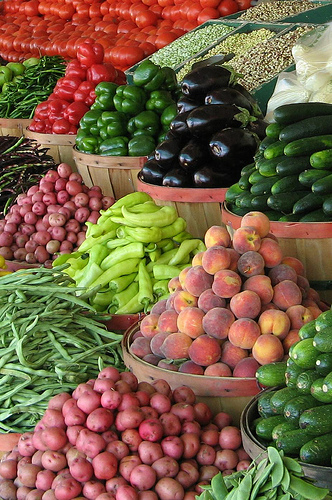Organic farming has been one of the fastest growing segments of U.S. agriculture for over a decade. After the USDA implemen ted national organic standards in 2002, certified organic farmland doubled by 2005. Organic livestock sectors have grown even faster. Despite the rapid growth, organic farms have struggled at times to produce sufficient supply to keep up with the rapid growth in demand, leading to periodic shortages of organic products.
ted national organic standards in 2002, certified organic farmland doubled by 2005. Organic livestock sectors have grown even faster. Despite the rapid growth, organic farms have struggled at times to produce sufficient supply to keep up with the rapid growth in demand, leading to periodic shortages of organic products.
According to the USDA Economic Research Service, or ERS, U.S. organic-industry growth is evident in an expanding number of retailers selling a wider variety of foods, the development of private-label product lines by many supermarkets, and the widespread introduction of new products. A broader range of consumers has been buying more varieties of organic food. Only one segment has not kept pace—organic farms have struggled at times to produce sufficient supply to keep up with the rapid growth in demand, leading to periodic shortages of organic products.
This may be because when it comes to organic agriculture, small is beautiful. According to Sustainable Agriculture Research and Education, new data defy conventional wisdom: researchers have discovered that the majority of our nation’s crop sales come not from America’s storied “fruited plains,” but from smaller farms tucked between developments just beyond our cities’ limits. Seventy nine percent of the nation’s fruit crop sales and 68 percent of vegetable crop sales come from what policymakers are calling the Rural-Urban Interface (RUI) or exurbia.
That’s because the United States has seen a new migration—from urban centers to cities’ verdant fringes. Modern-day homesteaders are settling on relatively small plots carved from larger-acreage farms and ranches—a trend borne out by the 2007 Census of Agriculture, which showed that from 1997 to 2007 the amount of land occupied by farms of less than 50 acres grew an impressive 46 percent.
Nationwide
Organic farming has been one of the fastest growing segments of U.S. agriculture for over a decade. After the USDA implemented national organic standards in 2002, certified organic farmland doubled by 2005. Organic livestock sectors have grown even faster.
California is the leading State in certified organic cropland, with over 430,000 acres, largely (over 40 percent) used for fruit and vegetable production. Other top States for certified organic cropland include Wisconsin, North Dakota, Minnesota, and Montana. Forty-five States also had some certified organic rangeland and pasture in 2008, and 13 States had more than 100,000 acres, reflecting strong growth in the U.S. organic dairy sector between 2005 and 2008.
Adoption of organic farming systems showed strong gains between 2002 and 2008, averaging a 15 percent annual increase i n cropland acreage during this period. However, only about 0.7 percent of all U.S. cropland and 0.5 percent of all U.S. pasture was certified organic in 2008.
n cropland acreage during this period. However, only about 0.7 percent of all U.S. cropland and 0.5 percent of all U.S. pasture was certified organic in 2008.
Obstacles to adoption by farmers include high managerial costs and risks of shifting to a new way of farming, limited awareness of organic farming systems, lack of marketing and infrastructure, and inability to capture marketing economies. Still, many U.S. producers are embracing organic farming in order to lower input costs, conserve nonrenewable resources, capture high-value markets, and boost farm income.
A marketing boom has pushed retail sales of organic foods up to $21.1 billion in 2008 from $3.6 billion in 1997. The 2008 Farm Act allocated $5 million in initial spending for an expanded organic data collection initiative, along with an additional $5 million per year of authorized funding for research. Data reveals that the one factor that consistently influences the likelihood of a consumer’s buying organic products is education.
Resources
Fortunately for new farmers wishing to enter the market or for old hands considering converting to organic, there are many excellent resources with information on both the technical and business/financial side of organic operations.
Since 1988, the Sustainable Agriculture Research and Education (SARE) program has helped advance farming systems that are profitable, environmentally sound and good for communities through a nationwide research and education grants program. SARE’s mission is to advance – to the whole of American agriculture – innovations that improve profitability, stewardship and quality of life by investing in groundbreaking research and education.
The national outreach office of the SARE program is supported by the National Institute of Food and Agriculture (NIFA), U.S. Department of Agriculture. NIFA is the former Cooperative State Research, Education and Extension Service (CSREES).
SARE operates under cooperative agreements with the University of Maryland and the University of Vermont to develop and disseminate information about sustainable agriculture.
SARE believes farmers and ranchers know best when it comes to improving their systems. Whether they need to limit off-farm inputs, reduce erosion, create more time for family or community activities, learn marketing skills, or find other ways to enhance their livelihoods, farmers and ranchers can turn to SARE for a financial boost to achieve their goals.
SARE runs a competitive grants program. Calls for proposals usually come out in August for funding awarded the following spring. Grants cover the following:
- Research and Education Grants: Ranging from $30,000 to $150,000 or more, for scientists, producers, and others working in an interdisciplinary fashion.
- Professional Development Grants: These projects educate Cooperative Extension Service staff and other ag professionals.
- Producer Grants: Producers apply for grants that typically run between $1,000 and $15,000 to conduct research, marketing and demonstration projects and share the results with other farmers and ranchers.
- On Farm Research/Partnership: Supports on-farm research by Extension, NRCS, and/or nonprofit organizations.
- Sustainable Community Innovation: Forges connections between sustainable agriculture and rural community development.
Since 1992, the Organic Farming Research Foundation's grantmaking program has awarded more than $1.5 million for over 200 projects. Their grantmaking objective is to generate practical, science-based knowledge to support modern organic farming systems. OFRF-funded projects emphasize grower-researcher collaboration, studies conducted on-farm and/or in certified organic settings, and outreach concerning project results.
The National Center for Alternative Technology has a mission of helping people by championing small-scale, local, and sustainable solutions to reduce poverty, promote healthy communities, and protect natural resources. Several of their initiatives revolve around organic agriculture, including:
- The Slow-growing Broiler Project is a University of Arkansas project to research the potential for raising organic slow-growing broiler chickens without supplemental methionine. "Energy alternatives" workshops in 12 Eastern and Southern states, which focus on energy efficiency and renewable energy on farms.
- ATTRA, the National Sustainable Agriculture Information Service offers the latest in sustainable agriculture and organic farming news, events and funding opportunities. They also offer in-depth publications on production practices, alternative crop and livestock enterprises, innovative marketing, organic certification, and highlights of local, regional, USDA and other federal sustainable agriculture activities.
For example, articles on “Accessing the Environmental Quality Incentive Program (EQIP) Organic Initiative for Conversion or Expansion” and "Accessing the New Conservation Stewardship Program" provide detailed advice for organic farmers on how to take advantage of EQIP and CSP funding available through the NRCS.
Attra also maintains a growing library of “webinars” that provide instruction on distinct topics via video. Finally, ATTRA’s searchable databases give organic farmers the ability to seek specific solutions to specific problems. The databases include:
- ecological pest management
- energy alternatives
- sustainable farming internships
- organic livestock feed supplies
- measurements, conversion units and calculations
- local food directories
- sources of organic fertilizers and amendments
- small poultry processing plants and services
- sustainable agriculture organizations and publications
- directory of organic seed suppliers
The National Sustainable Agriculture Coalition, or NSAC, is the leading voice for sustainable agriculture in the federal policy arena, joining together the voices of grassroots farm, food, conservation, and rural organizations from all regions of the country to advocate for federal policies and programs supporting the long-term economic, social, and environmental sustainability of agriculture, natural resources, and rural communities.
NSAC works to reform and construct policies and programs that:
- ensure opportunity and fairness for small and medium-sized family farms;
- promote agricultural practices that conserve soil, water, wildlife habitat, and energy resources;
- increase the ability of beginning farmers to enter into farming;
- encourage new and existing farmers to transition to sustainable and organic production practices;
- expand cutting edge on-farm research and extension for sustainable agriculture;
- enable producer access to local and regional food systems;
- increase consumer accessibility to sustainably-produced foods.
Over half of all new jobs created in the most rural regions of the nation come from small, non-farm business ventures. Therefore, non-agriculture job creation is imperative for the survival of rural communities. The National Sustainable Agriculture Coalition is working with its members to help promote rural entrepreneurship and small business success in rural communities. This is part of the larger strategy to revitalize agricultural communities in an equitable manner that provides meaningful employment and gives people a lasting stake in their communities.
For jobs and learning experiences, the "greenest" place to post and find jobs in the organic farming business is Organic Farming Jobs.
The Greenhorns is a website designed to promote, recruit and support young farmers in America. The provide information, a forum, a long list of blogs, and a guidebook for beginning organic farmers--free. They are also creating a documentary about organic farming in America, and its roots in the past.
 Sign In
Sign In
 Sign In
Sign In
